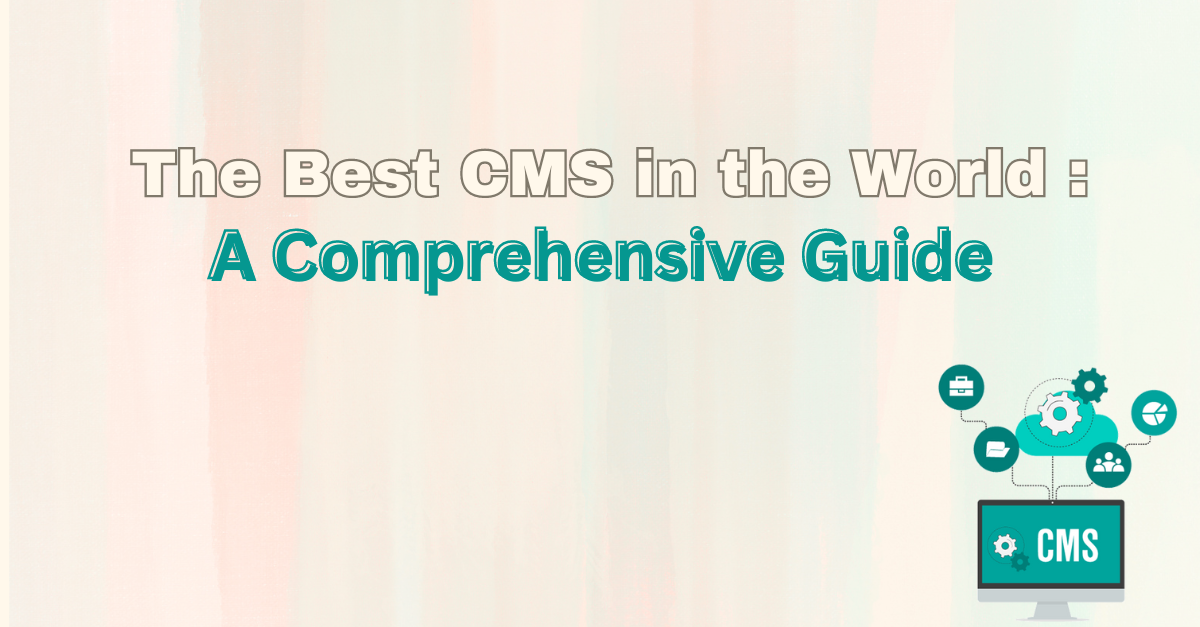In the ever-evolving digital landscape, a Content Management System (CMS) is the backbone of most websites. Whether you’re a blogger, a business owner, or a developer, choosing the right CMS can make or break your online presence. With numerous options available, it’s essential to understand what makes a CMS stand out. Here, we’ll explore the best CMS platforms in the world, focusing on their features, benefits, and ideal use cases.
1. WordPress
Overview
WordPress is arguably the most popular CMS globally, powering over 40% of all websites. Initially designed as a blogging platform, WordPress has evolved into a versatile CMS suitable for various types of websites, including e-commerce, portfolios, forums, and more.
Features
- User-Friendly Interface: WordPress boasts an intuitive interface, making it accessible even for beginners.
- Extensive Plugin Ecosystem: With over 58,000 plugins, WordPress can be customized to meet any specific needs.
- SEO Friendly: WordPress is designed with SEO in mind, helping websites rank higher in search engines.
- Active Community: A robust community of developers and users provides extensive support and resources.
Ideal For
- Bloggers and content creators
- Small to medium-sized businesses
- E-commerce websites using WooCommerce
2. Joomla!
Overview
Joomla! is another popular open-source CMS known for its flexibility and robust features. It’s a bit more complex than WordPress but offers greater control over your website’s structure and content.
Features
- Advanced User Management: Joomla! provides a more sophisticated user management system, making it ideal for membership sites.
- Multilingual Support: Joomla! offers built-in multilingual support, perfect for global websites.
- Powerful Extensions: With thousands of extensions available, Joomla! can be tailored to various needs.
Ideal For
- Membership sites
- Social networking sites
- Multilingual websites
3. Drupal
Overview
Drupal is a powerful CMS favored by developers for its flexibility and scalability. It’s highly customizable, making it suitable for complex and large-scale websites.
Features
- Custom Content Types: Drupal allows you to create custom content types and fields, providing unparalleled flexibility.
- Advanced Taxonomy: Drupal’s taxonomy system is highly sophisticated, enabling detailed content categorization.
- High Performance: Known for its robustness, Drupal can handle large amounts of traffic and complex database queries.
Ideal For
- Large enterprises
- Government websites
- Educational institutions
4. Shopify
Overview
Shopify is a leading CMS for e-commerce websites. It provides a comprehensive solution for online stores, including payment processing, inventory management, and marketing tools.
Features
- Easy Setup: Shopify simplifies the process of setting up an online store.
- Integrated Payment Processing: Shopify Payments integrates seamlessly, supporting various payment methods.
- Mobile Responsiveness: All Shopify themes are mobile-responsive, ensuring a great user experience across devices.
Ideal For
- E-commerce businesses
- Online retailers
- Dropshipping stores
5. Wix
Overview
Wix is a cloud-based website builder and CMS known for its drag-and-drop interface. It’s an excellent choice for users who want to create visually stunning websites without any coding knowledge.
Features
- Drag-and-Drop Builder: Wix’s intuitive builder allows users to design their sites visually.
- Template Variety: With hundreds of professionally designed templates, Wix offers a wide range of design options.
- App Market: Wix’s app market provides numerous apps to extend the functionality of your website.
Ideal For
- Small businesses
- Personal websites
- Portfolios
Conclusion
Choosing the best CMS depends on your specific needs and technical expertise. WordPress remains a top choice for its ease of use and extensive customization options, making it ideal for a wide range of websites. Joomla! and Drupal offer more advanced features for those requiring greater flexibility and control. Shopify stands out as the best CMS for e-commerce, while Wix is perfect for users who prioritize design and simplicity.
Ultimately, the “best” CMS is subjective and varies from one project to another. Evaluate your requirements, test different platforms, and choose the one that best aligns with your goals. With the right CMS, you can build a robust, scalable, and user-friendly website that meets all your needs.
#Ai1security #website #wordpress #webdesign #webdeveloper #cybersecurity #websecurity


